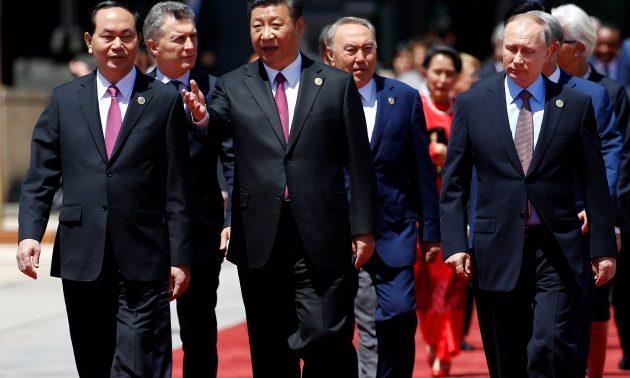
Belt and Road: Critics and champions duke it out
Almost five years after China's current president announced an ambitious plan to build rails and ports across the globe, the battle lines have been drawn between pundits in the press.
This week some new jabs and counterpunches were thrown.
The Economist tried to figure out just how the China-led Belt and Road Initiative stacked up to America's Marshall Plan, which is credited in lore with the restoration of post-WWII Europe. While the article , to be published in the next print edition of the magazine, started off by cutting the Marshall plan down to size, it unsurprisingly used the opportunity to criticize Beijing's infrastructure initiative.
The Marshall Plan, after all, is synonymous with statesmanlike vision and vigour. According to Marshall's successor, Dean Acheson, America's provision of food, raw materials and equipment was described by Winston Churchill as the 'most unsordid act in history'[…]
[Economic historian Barry] Eichengreen calculates the direct impact as an increase in growth of only 0.3 percentage points over the plan's life. Nor was it actually the 'most unsordid act' of its time. Churchill in fact bestowed that praise not on the Marshall Plan but on America's earlier 'lend-lease' policy, which aided the Allies from 1941 to 1945.
While, by the Economist's calculations, the BRI will likely see a total investment that dwarfs that of the Marshall plan in its dollar amount, it still falls short, in the magazine's view.
The BRI will have no comparable influence. China is still wary of meddling in the internal economic affairs of other countries (unless its core interests are threatened). And most of the BRI economies already enjoy more economic freedom than China. The Marshall Plan worked by giving markets a decisive role in allocating resources. The BRI will not even try to export that principle abroad. After all, its sponsor has yet to adopt it at home.Meanwhile, Wenshan Jia pushed back against Western critics in an article published Friday by the South China Morning Post.
China has done a proper job of explaining to the West what the initiative is and extended a sincere invitation to each country to join. Many think tank scholars and major media outlets in the West have found it potentially lucrative and expressed relatively strong support.Yet, instead of appreciating China's efforts to both inherit the liberal agenda of globalisation and forge a new path for global development, many Western political elite, led by the US, have started a campaign to resist the initiative. From Australia to the US , and the UK to Germany, there are calls for the West to cut interactions with China to minimise or resist its so-called 'sharp power'. The labels typically applied to China include 'authoritarian' and 'predatory', citing Beijing for not upholding 'freedom, democracy and individual rights', the core values of the West.
[…]The core principles of Xi's belt and road strategy must be always applied in China's interactions with local strategies. If China is, as German Foreign Minister Sigmar Gabriel told the Munich Security Conference in February, 'the only country in the world with any sort of genuinely global, geostrategic concept', then Western leaders should cultivate a genuinely global strategy in line with China's vision, for the betterment of all humankind.
The daily<> Must-reads from across Asia - directly to your inbox <> <> <> <> Asia Unhedged Belt and Road One Belt One Road Comments
Legal Disclaimer:
MENAFN provides the
information “as is” without warranty of any kind. We do not accept
any responsibility or liability for the accuracy, content, images,
videos, licenses, completeness, legality, or reliability of the information
contained in this article. If you have any complaints or copyright
issues related to this article, kindly contact the provider above.

















Comments
No comment